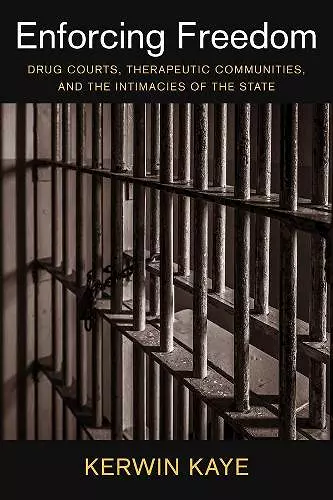Enforcing Freedom
Drug Courts, Therapeutic Communities, and the Intimacies of the State
Format:Paperback
Publisher:Columbia University Press
Published:3rd Jan '20
Currently unavailable, and unfortunately no date known when it will be back

In 1989, the first drug-treatment court was established in Florida, inaugurating an era of state-supervised rehabilitation. Such courts have frequently been seen as a humane alternative to incarceration and the war on drugs. Enforcing Freedom offers an ethnographic account of drug courts and mandatory treatment centers as a system of coercion, demonstrating how the state uses notions of rehabilitation as a means of social regulation.
Situating drug courts in a long line of state projects of race and class control, Kerwin Kaye details the ways in which the violence of the state is framed as beneficial for those subjected to it. He explores how courts decide whether to release or incarcerate participants using nominally colorblind criteria that draw on racialized imagery. Rehabilitation is defined as preparation for low-wage labor and the destruction of community ties with “bad influences,” a process that turns participants against one another. At the same time, Kaye points toward the complex ways in which participants negotiate state control in relation to other forms of constraint in their lives, sometimes embracing the state’s salutary violence as a means of countering their impoverishment. Simultaneously sensitive to ethnographic detail and theoretical implications, Enforcing Freedom offers a critical perspective on the punitive side of criminal-justice reform and points toward alternative paths forward.
In Enforcing Freedom, Kaye masterfully shows how drug courts and associated therapeutic communities update concepts of cultures of poverty and biological race with contemporary idioms of addiction as brain disease and welfare dependency. Blending political and historical analysis of U.S. drug war and rehabilitation ideologies with keen ethnographic observation, this book is a must-read to understand the seduction of drug courts as a false alternative to racialized mass incarceration. -- Helena Hansen, author of Addicted to Christ: Remaking Men in Puerto Rican Pentecostal Drug Ministries
Kaye has written an important, insightful, and nuanced ethnographic study of urban drug courts and, more unusually, the privatized therapeutic communities upon which they rely to deliver drug treatment services. His unique examination of the arms-length relationship between these somewhat mysterious private treatment providers and the formal court system is revelatory and spot on. While he provides a highly critical analysis, Kaye also makes a number of thoughtful ‘real world’ policy recommendations that build on and flow from his findings, and that will appeal to judicial and treatment policymakers. -- Michael Jacobson, author of Downsizing Prisons: How to Reduce Crime and End Mass Incarceration
Kerwin Kaye examines how American institutions that govern illegal drug use, especially drug courts and treatment programs, define and treat 'addiction.' This book offers new findings that show how efforts at drug control regulate citizenship and reflect racial and gender politics, ultimately revealing the intimate character of neoliberal state governance. -- Allison McKim, author of Addicted to Rehab: Race, Gender, and Drugs in the Era of Mass Incarceration
Kaye not only explodes the neoliberal mythology of the beneficence of drug courts and other diversion schemes but also lays bare their continuing coercive and even brutalizing potential. Supporters and skeptics of drug courts alike will find much to consider in this forceful ethnography. And all of us who are interested in envisioning a post–War on Drugs United States should seriously consider Kaye’s suggestions. -- Samuel Kelton Roberts Jr., author of Infectious Fear: Politics, Disease, and the Health Effects of Segregation
Offers new and vital insights into our understanding of the insidious ways that the criminal justice system oppresses people who use drugs. * Filter Magazine *
Enforcing Freedom is so magnificent. Kaye’s years of research have paid off in a pioneering book whose intellectual gems make mining its tectonic depths more than worth the effort. Five stars. * LSE Review of Books *
Kaye’s book is rich in theory and this may be off-putting to those looking for a more nuts and bolts discussion of drug courts or their role as an “evidence-based best practice,” but there is much for practitioners to learn from Kaye’s critical perspective. The book is also more appropriate for graduate students versus undergraduates. Overall, I consider Enforcing Freedom essential for those doing serious sociological work on drug control policy or new models of social control. * Social Forces *
A passionate, well-articulated critique that offers a mix of theoretical exposition and ethnography-based critique. * American Journal of Sociology *
ISBN: 9780231172899
Dimensions: unknown
Weight: unknown
360 pages